
homeassistant-midea-air-appliances-lan
This Home Assistant custom component adding support for controlling Midea air conditioners and dehumidifiers on local network.
Stars: 343
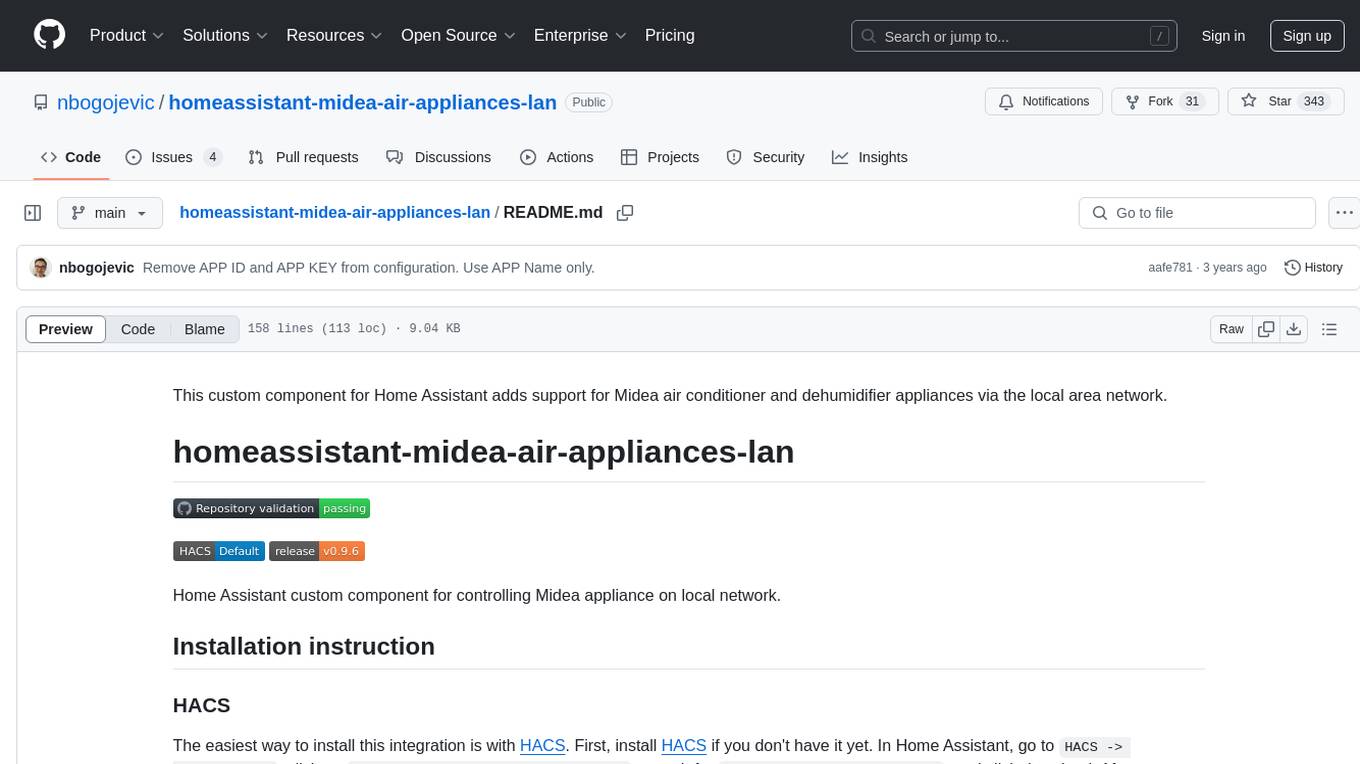
This custom component for Home Assistant adds support for controlling Midea air conditioner and dehumidifier appliances via the local area network. It provides integration for various Midea appliances, allowing users to control settings such as humidity levels, fan speed, and more through Home Assistant. The component supports multiple protocols and entities for different appliance models, offering a comprehensive solution for managing Midea appliances on the local network.
README:
This custom component for Home Assistant adds support for Midea air conditioner and dehumidifier appliances via the local area network.
Home Assistant custom component for controlling Midea appliance on local network.
The easiest way to install this integration is with HACS. First, install HACS if you don't have it yet. In Home Assistant, go to HACS -> Integrations, click on + Explore & Download Repositories, search for Midea Air Appliances (LAN), and click download. After download, restart Home Assistant.
Once the integration is installed, you can add it to the Home Assistant by going to Configuration -> Devices & Services, clicking + Add Integration and searching for Midea Air Appliances (LAN) or, using My Home Assistant service, you can click on:
- Update Home Assistant to version 2021.12 or newer.
- Clone this repository.
- Copy the
custom_components/midea_dehumidifier_lanfolder into your Home Assistant'scustom_componentsfolder.
- Add
Midea Air Appliances (LAN)integration via UI. - Enter Midea cloud username and password and select mobile application you use.
- The integration will discover appliance on local network(s).
- If an appliance is not automatically discovered, but is registered to the cloud account, user is prompted to enter IPv4 address of the appliance.
- If you want to use integration with air conditioner unit(s), please select the checkbox on
Advanced settingspage.
- If IPv4 address of appliance changes, new IPv4 address will not be used until Home Assistant's restart.
- If Home Assistant installation doesn't have access to physical network, the integration may not discover all appliances.
- Dehumidifier modes correspond to Inventor EVA ΙΟΝ Pro Wi-Fi model. Your dehumidifier might use different names (e.g.,
Boostinstead ofDry) - Having two integrations accessing the same device can result in undefined behavior. For example, having two Home Assistant instances accessing same device, or using one of other Midea appliance integrations in combination with this one. To avoid problems, use a single integration - this one 🙂.
- If you encounter issues after upgrading, uninstall the integration, restart Home Assistant and re-install it.
- Some of sensors and switches are disabled by default. You need to enable them manually. See tables below for more information.
- Temperature sensor on dehumidifier is often under-reporting real ambient temperature. This may be due to sensor proximity to cooling pipes of the humidifier, algorithm, or electronics error. The under-reporting depends on the active mode, and stronger modes may result in larger offset from real temperature.
- Some Midea appliances, built in 2021 and later, use Tuya based patform and this integration will not work with them. In some cases those appliances have have same model names as old ones.
- When migrating from version 0.6 or 0.7 to 0.8, integration may fail. Please remove and re-install integration.
- Comfee MDDF-16DEN7-WF or MDDF-20DEN7-WF (tested with 20L version)
- Inventor EVA ΙΟΝ Pro Wi-Fi (EP3-WiFi 16L/20L) (tested with 20L version)
- Inventor Eva II Pro Wi-Fi (EVP-WF16L/20L)
- Pro Breeze 30L Smart Dehumidifier with Wifi / App Control
- Midea SmartDry dehumidifiers (22, 35, 50 pint models)
- Midea Cube dehumidifiers (20, 35, 50 pint models)
Supported are V3 and V2 protocols that allow local network access. V3 protocol requires one connection to Midea cloud to get token and key needed for local network access. Some old models use V1 XML based protocol which is not supported. Some newer models use Tuya protocol.
This custom component creates following entities for each discovered dehumidifier:
| Platform | Description |
|---|---|
humidifier |
Dehumidifier entity. Depending on the model following modes are supported: Set, Continuos, Smart (if supported), Dry (if supported), Antimould (if supported), Purifier (if supported). |
fan |
Fan entity for controlling dehumidifier fan. Three preset modes are available: Low, Medium and High. |
binary_sensor |
Problem sensor indicating when tank is full. |
binary_sensor |
Problem sensor indicating when tank is removed (created if device announces that pump is supported). |
binary_sensor |
Problem sensor indicating when filter needs cleaning (created if device announces that filter is supported). |
binary_sensor |
Cold sensor indicating defrosting is active (disabled by default). |
sensor |
Sensors for current relative humidity measured by dehumidifier. |
sensor |
Sensor for current temperature measured by dehumidifier. |
sensor |
Sensor for water level in the tank (created if device announces that water level is supported). |
switch |
Switch ion mode on and off (created if device announces that (an)ion mode is supported) |
switch |
Switch pump on and off (created if device announces that pump is supported). |
switch |
Switch to enable pump (created if device announces that pump is supported). |
switch |
Switch to activate beep on action (disabled by default). |
In addition to this, humidifier entity will have additonal attributes describing capabilities, current and last error code, time of last error, as well as last payloads received.
This custom component creates following entities for each discovered air conditioner:
| Platform | Description |
|---|---|
climate |
Climate entity. |
sensor |
Sensor for outside temperature measured by air conditioner. |
switch |
Switch purifier mode on and off (enabled if device announces that it is supported). |
switch |
Switch dryer mode on and off (disabled by default). |
switch |
Switch to activate beep on action (disabled by default). |
switch |
Switch display to Fahrenheit degrees (enabled if device announces that it is supported). |
switch |
Switch turbo fan on and off (enabled if device announces that it is supported). |
switch |
Switch screen on and off (enabled if device announces that it is supported). |
In addition to this, climate entity will have additonal attributes describing capabilities, current and last error code, time of last error, as well as last payloads received.
If there are problems while using integration setup, an advanced debug logging can be activated via Advanced settings page.
Once activated, logs can be see by clicking at:
Select Load Full Home Assistant Log to see all debug mode logs. Please include as much logs as possible if you open an issue.
Debug logging can be activated without going through setup process:
On entry page, paste following content:
service: logger.set_level
data:
custom_components.midea_dehumidifier_lan: DEBUG
midea_beautiful: DEBUGIt is possible to activate debug logging on Home Assistent start. To do this, open Home Assistant's configuration.yaml file on your machine, and add following to logger configuration:
logger:
# Begging of lines to add
logs:
custom_components.midea_dehumidifier_lan: debug
midea_beautiful: debug
# End of lines to addHome Assistant needs to be restarted after this change.
https://github.com/nbogojevic/midea-beautiful-air
Following Lovelace cards work well with this integration:
https://github.com/MiguelCosta/Dehumidifier_Comfee_Card
https://github.com/sicknesz/midea-inventor-card
Midea, Inventor, Comfee', Pro Breeze, and other names are trademarks of their respective owners.
For Tasks:
Click tags to check more tools for each tasksFor Jobs:
Alternative AI tools for homeassistant-midea-air-appliances-lan
Similar Open Source Tools

homeassistant-midea-air-appliances-lan
This custom component for Home Assistant adds support for controlling Midea air conditioner and dehumidifier appliances via the local area network. It provides integration for various Midea appliances, allowing users to control settings such as humidity levels, fan speed, and more through Home Assistant. The component supports multiple protocols and entities for different appliance models, offering a comprehensive solution for managing Midea appliances on the local network.
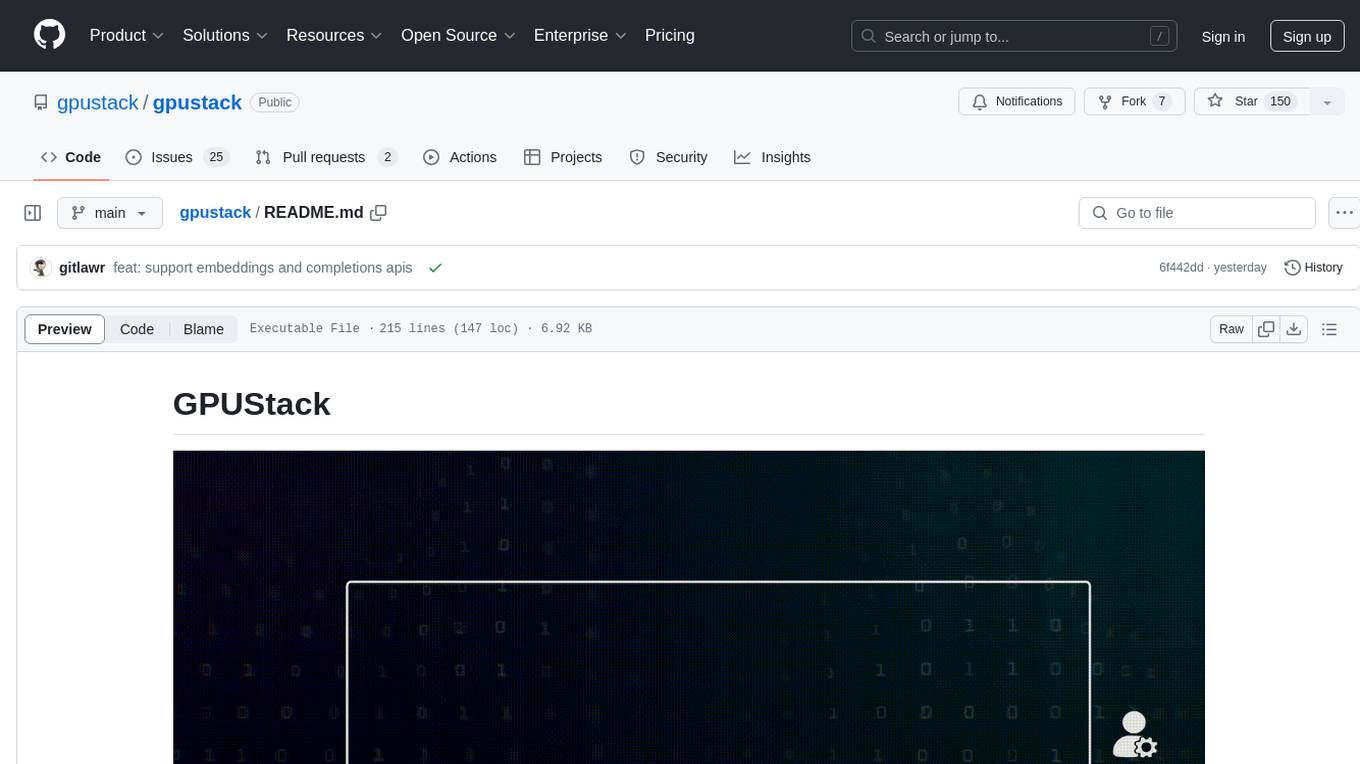
gpustack
GPUStack is an open-source GPU cluster manager designed for running large language models (LLMs). It supports a wide variety of hardware, scales with GPU inventory, offers lightweight Python package with minimal dependencies, provides OpenAI-compatible APIs, simplifies user and API key management, enables GPU metrics monitoring, and facilitates token usage and rate metrics tracking. The tool is suitable for managing GPU clusters efficiently and effectively.

mosec
Mosec is a high-performance and flexible model serving framework for building ML model-enabled backend and microservices. It bridges the gap between any machine learning models you just trained and the efficient online service API. * **Highly performant** : web layer and task coordination built with Rust 🦀, which offers blazing speed in addition to efficient CPU utilization powered by async I/O * **Ease of use** : user interface purely in Python 🐍, by which users can serve their models in an ML framework-agnostic manner using the same code as they do for offline testing * **Dynamic batching** : aggregate requests from different users for batched inference and distribute results back * **Pipelined stages** : spawn multiple processes for pipelined stages to handle CPU/GPU/IO mixed workloads * **Cloud friendly** : designed to run in the cloud, with the model warmup, graceful shutdown, and Prometheus monitoring metrics, easily managed by Kubernetes or any container orchestration systems * **Do one thing well** : focus on the online serving part, users can pay attention to the model optimization and business logic
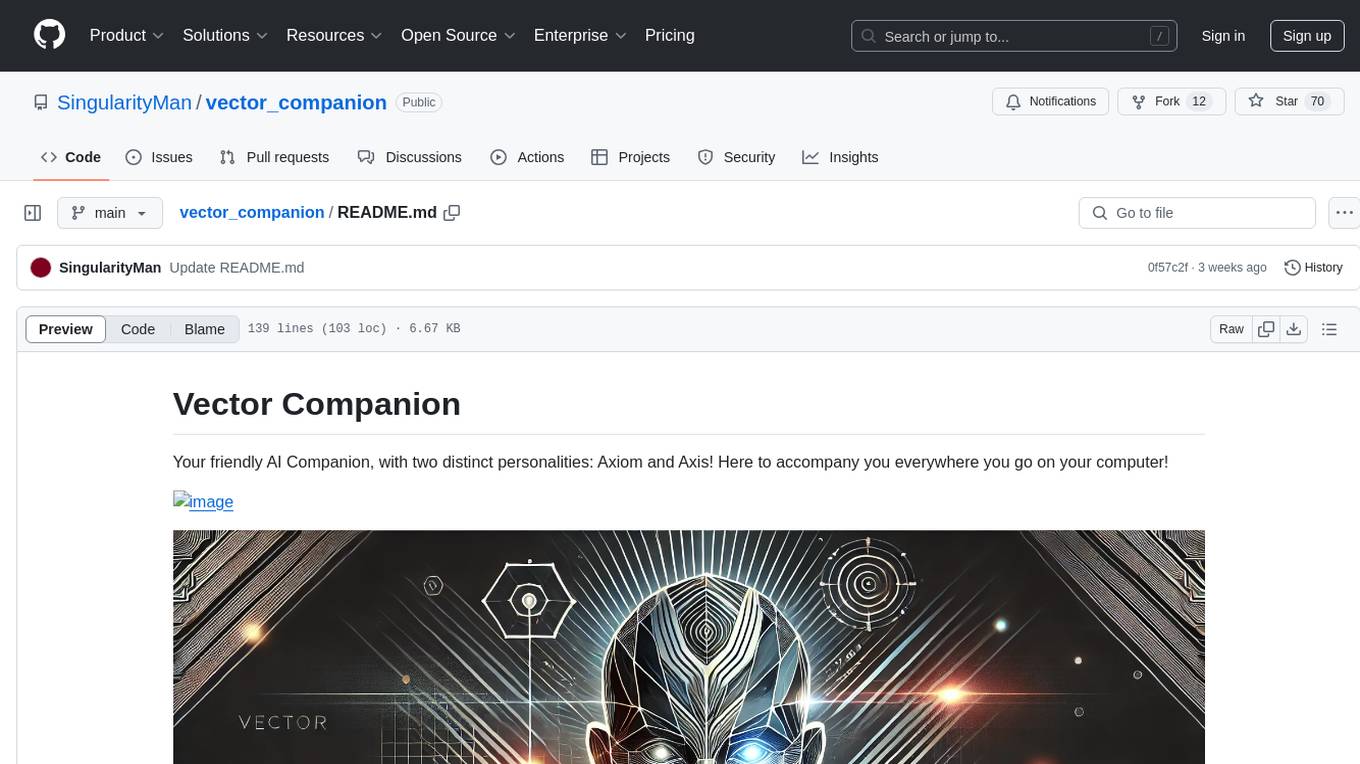
vector_companion
Vector Companion is an AI tool designed to act as a virtual companion on your computer. It consists of two personalities, Axiom and Axis, who can engage in conversations based on what is happening on the screen. The tool can transcribe audio output and user microphone input, take screenshots, and read text via OCR to create lifelike interactions. It requires specific prerequisites to run on Windows and uses VB Cable to capture audio. Users can interact with Axiom and Axis by running the main script after installation and configuration.
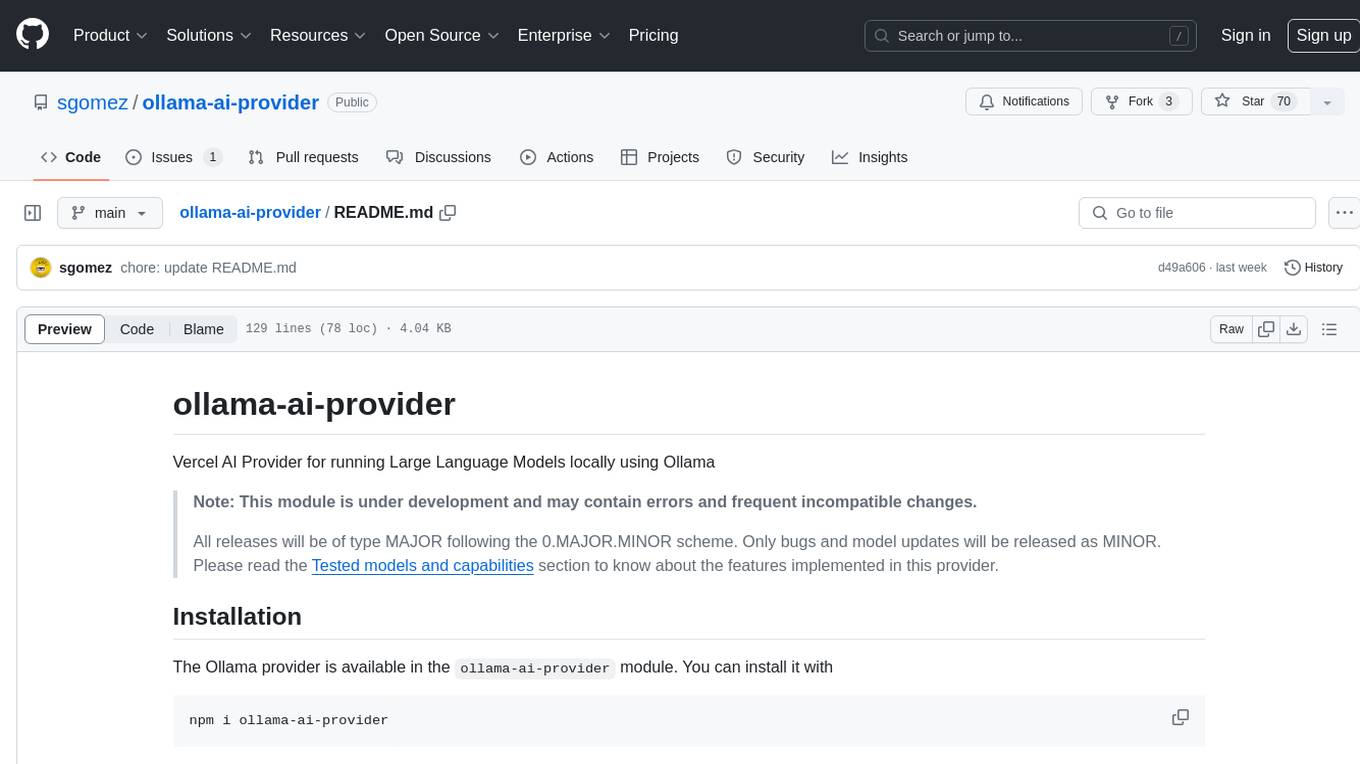
ollama-ai-provider
Vercel AI Provider for running Large Language Models locally using Ollama. This module is under development and may contain errors and frequent incompatible changes. It provides the capability of generating and streaming text and objects, with features like image input, object generation, tool usage simulation, tool streaming simulation, intercepting fetch requests, and provider management. The provider can be customized with optional settings like baseURL and headers.
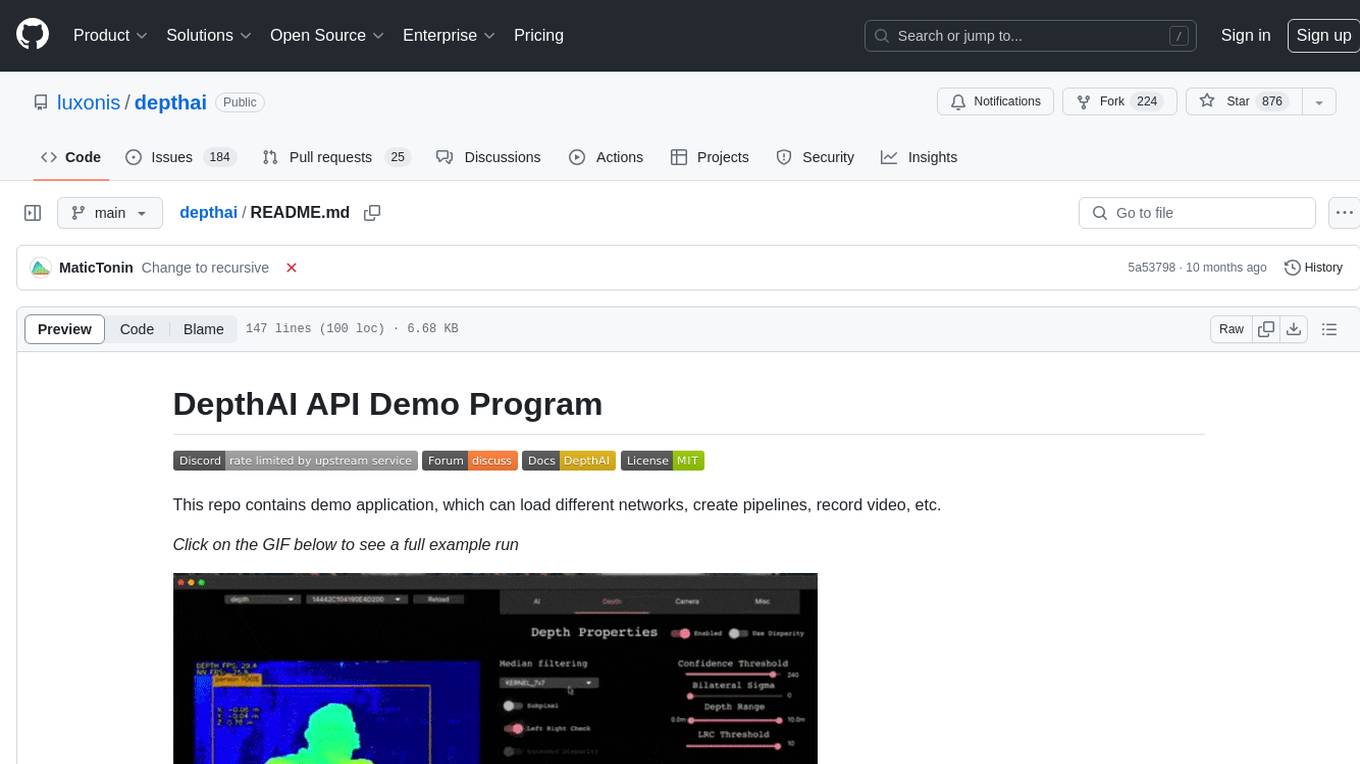
depthai
This repository contains a demo application for DepthAI, a tool that can load different networks, create pipelines, record video, and more. It provides documentation for installation and usage, including running programs through Docker. Users can explore DepthAI features via command line arguments or a clickable QT interface. Supported models include various AI models for tasks like face detection, human pose estimation, and object detection. The tool collects anonymous usage statistics by default, which can be disabled. Users can report issues to the development team for support and troubleshooting.
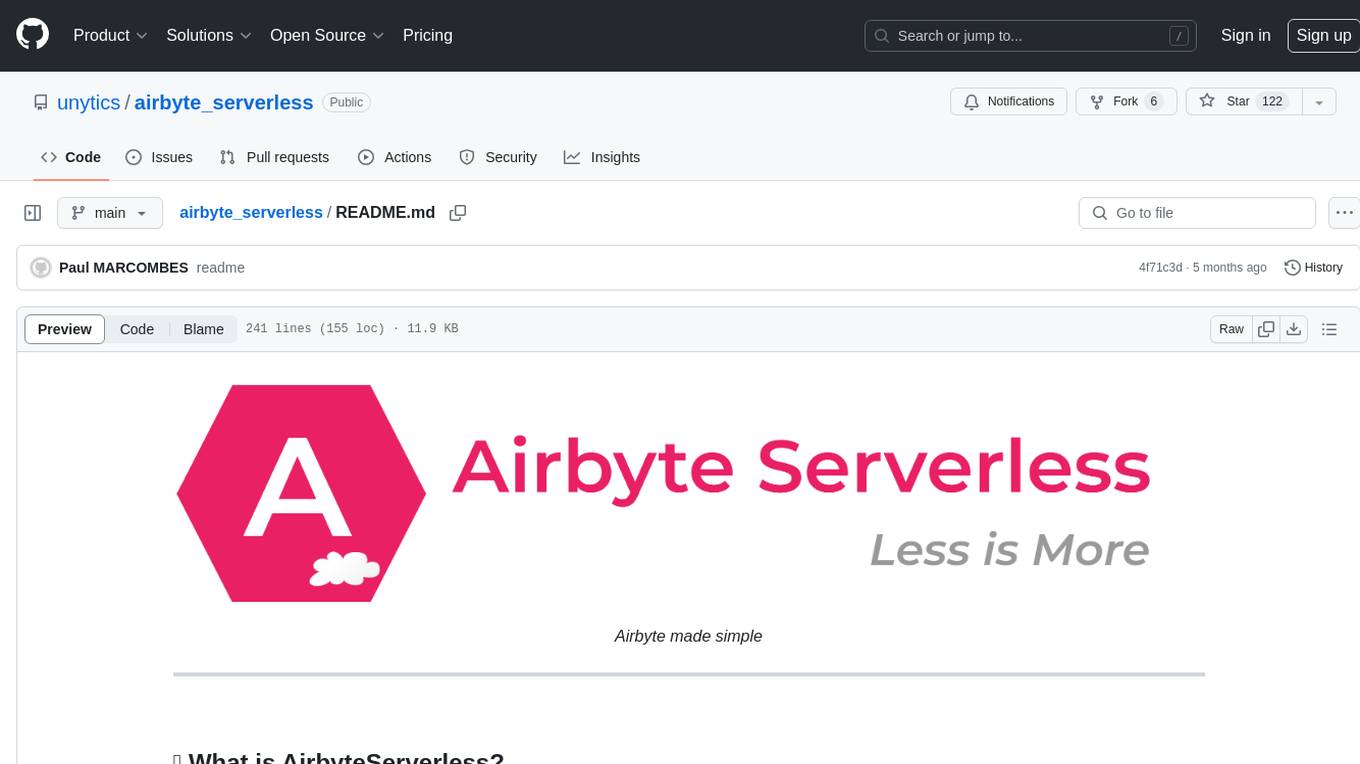
airbyte_serverless
AirbyteServerless is a lightweight tool designed to simplify the management of Airbyte connectors. It offers a serverless mode for running connectors, allowing users to easily move data from any source to their data warehouse. Unlike the full Airbyte-Open-Source-Platform, AirbyteServerless focuses solely on the Extract-Load process without a UI, database, or transform layer. It provides a CLI tool, 'abs', for managing connectors, creating connections, running jobs, selecting specific data streams, handling secrets securely, and scheduling remote runs. The tool is scalable, allowing independent deployment of multiple connectors. It aims to streamline the connector management process and provide a more agile alternative to the comprehensive Airbyte platform.
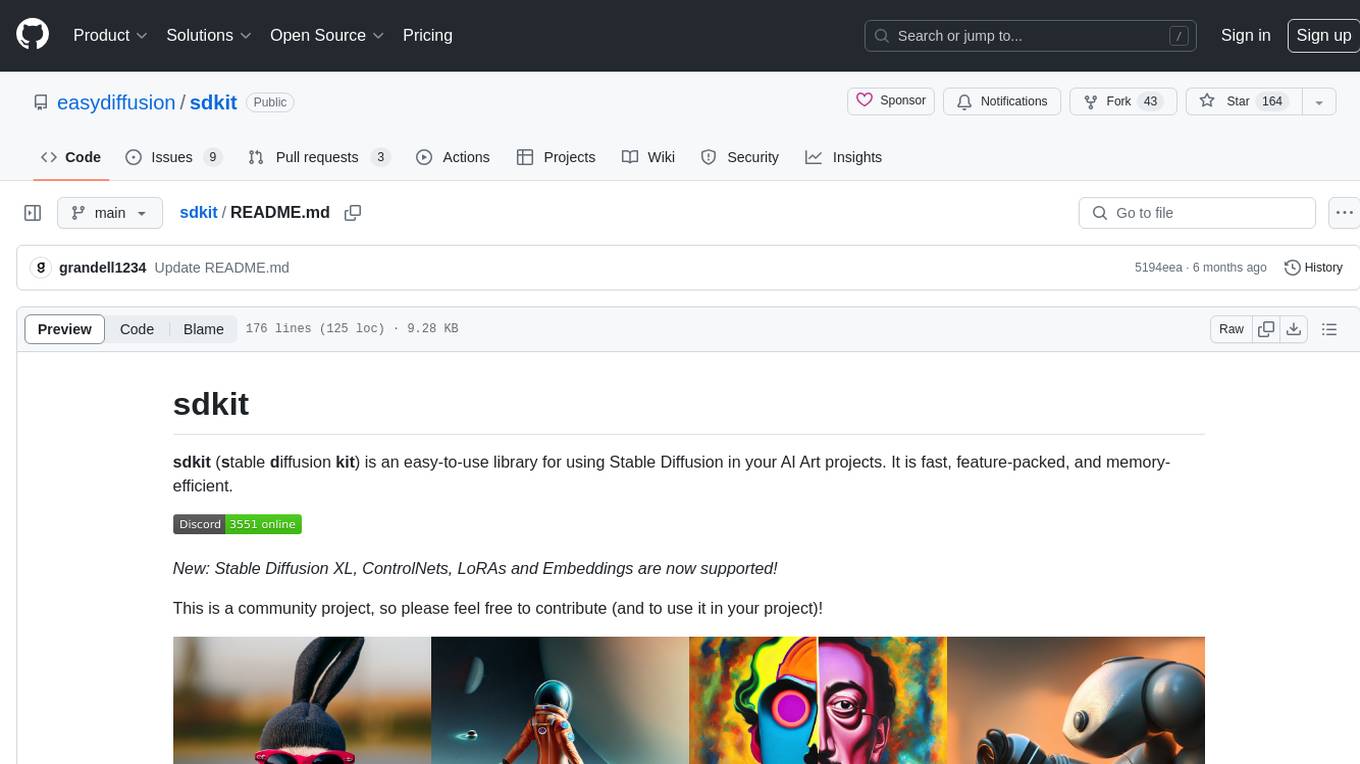
sdkit
sdkit (stable diffusion kit) is an easy-to-use library for utilizing Stable Diffusion in AI Art projects. It includes features like ControlNets, LoRAs, Textual Inversion Embeddings, GFPGAN, CodeFormer for face restoration, RealESRGAN for upscaling, k-samplers, support for custom VAEs, NSFW filter, model-downloader, parallel GPU support, and more. It offers a model database, auto-scanning for malicious models, and various optimizations. The API consists of modules for loading models, generating images, filters, model merging, and utilities, all managed through the sdkit.Context object.
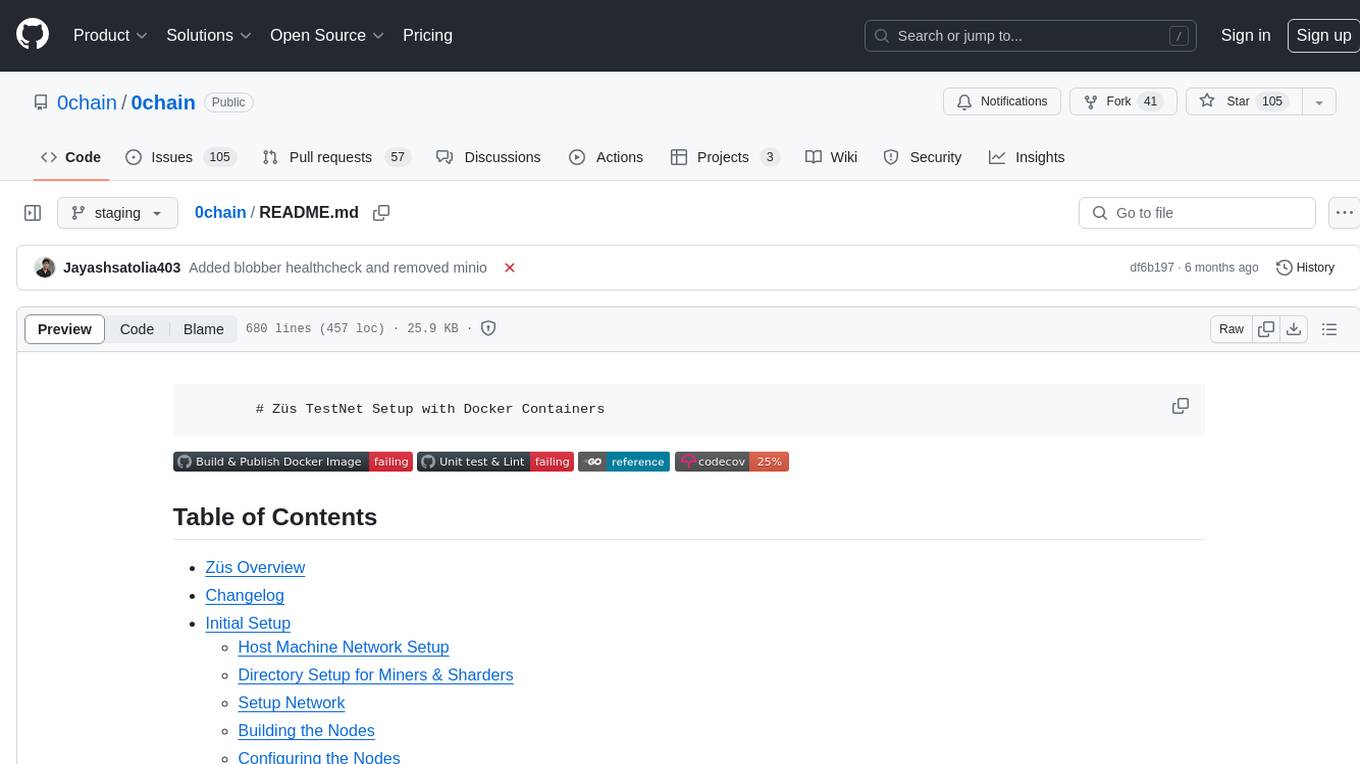
0chain
Züs is a high-performance cloud on a fast blockchain offering privacy and configurable uptime. It uses erasure code to distribute data between data and parity servers, allowing flexibility for IT managers to design for security and uptime. Users can easily share encrypted data with business partners through a proxy key sharing protocol. The ecosystem includes apps like Blimp for cloud migration, Vult for personal cloud storage, and Chalk for NFT artists. Other apps include Bolt for secure wallet and staking, Atlus for blockchain explorer, and Chimney for network participation. The QoS protocol challenges providers based on response time, while the privacy protocol enables secure data sharing. Züs supports hybrid and multi-cloud architectures, allowing users to improve regulatory compliance and security requirements.
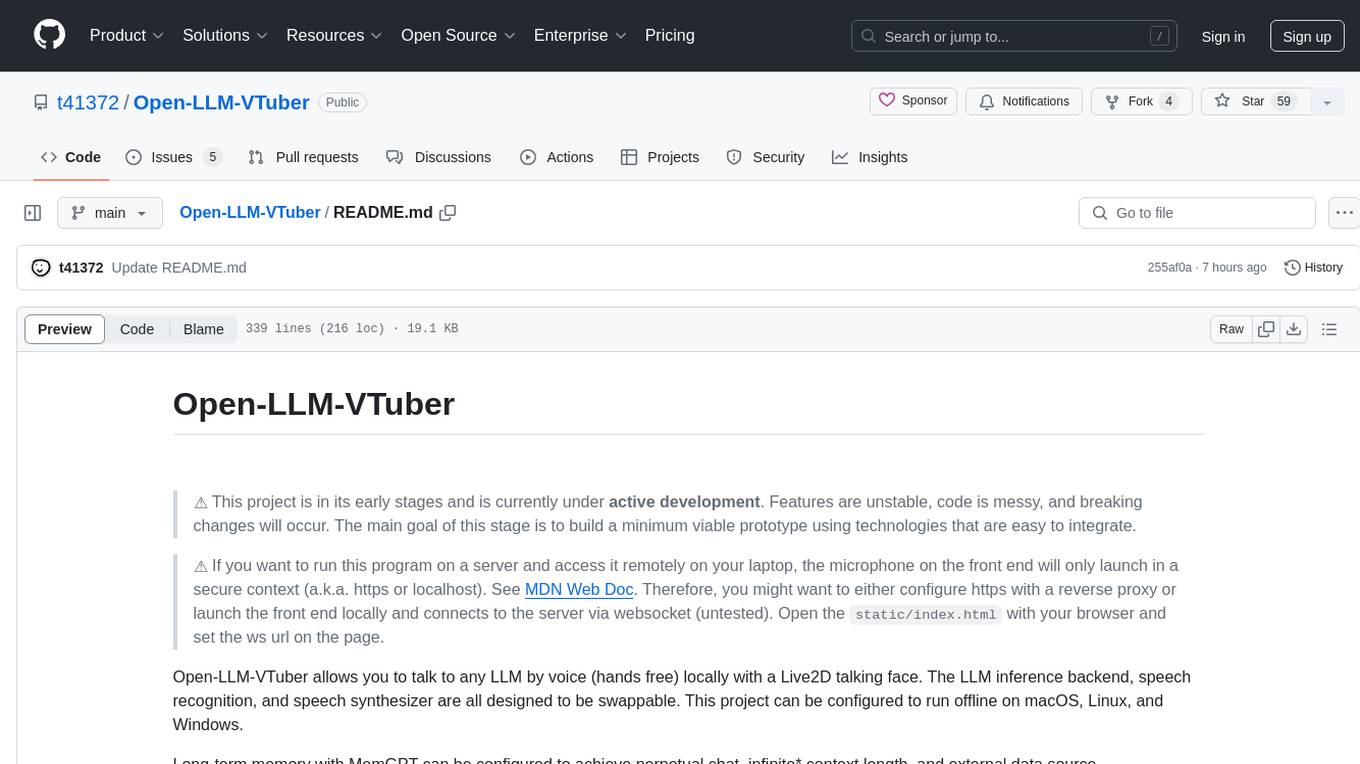
Open-LLM-VTuber
Open-LLM-VTuber is a project in early stages of development that allows users to interact with Large Language Models (LLM) using voice commands and receive responses through a Live2D talking face. The project aims to provide a minimum viable prototype for offline use on macOS, Linux, and Windows, with features like long-term memory using MemGPT, customizable LLM backends, speech recognition, and text-to-speech providers. Users can configure the project to chat with LLMs, choose different backend services, and utilize Live2D models for visual representation. The project supports perpetual chat, offline operation, and GPU acceleration on macOS, addressing limitations of existing solutions on macOS.
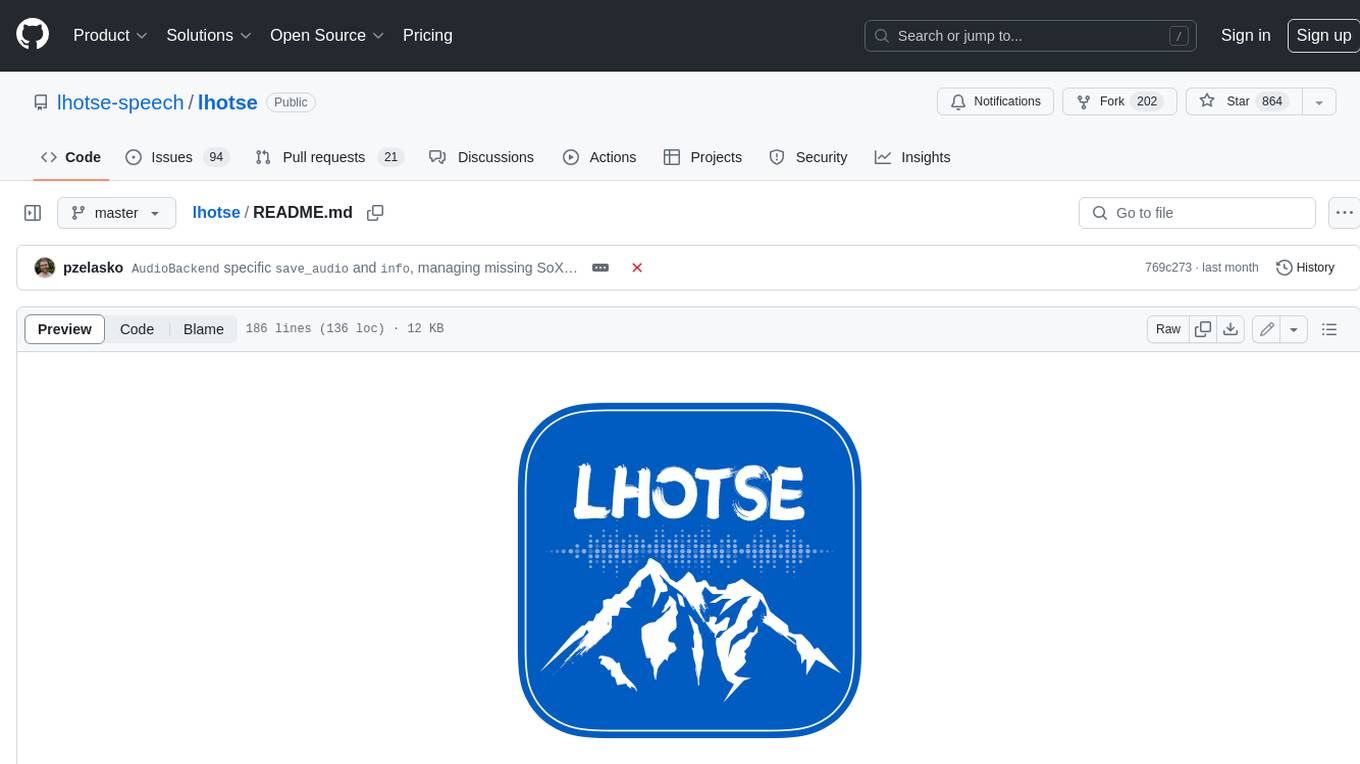
lhotse
Lhotse is a Python library designed to make speech and audio data preparation flexible and accessible. It aims to attract a wider community to speech processing tasks by providing a Python-centric design and an expressive command-line interface. Lhotse offers standard data preparation recipes, PyTorch Dataset classes for speech tasks, and efficient data preparation for model training with audio cuts. It supports data augmentation, feature extraction, and feature-space cut mixing. The tool extends Kaldi's data preparation recipes with seamless PyTorch integration, human-readable text manifests, and convenient Python classes.
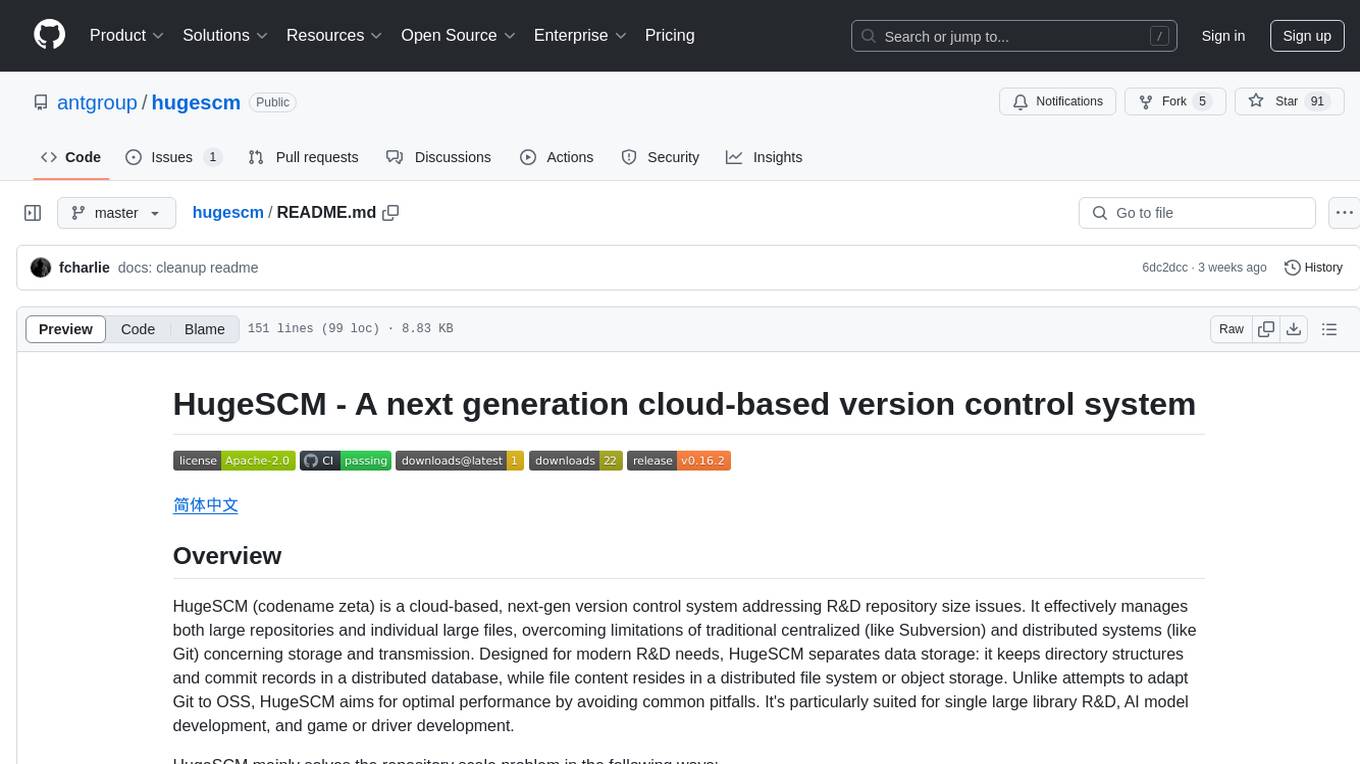
hugescm
HugeSCM is a cloud-based version control system designed to address R&D repository size issues. It effectively manages large repositories and individual large files by separating data storage and utilizing advanced algorithms and data structures. It aims for optimal performance in handling version control operations of large-scale repositories, making it suitable for single large library R&D, AI model development, and game or driver development.
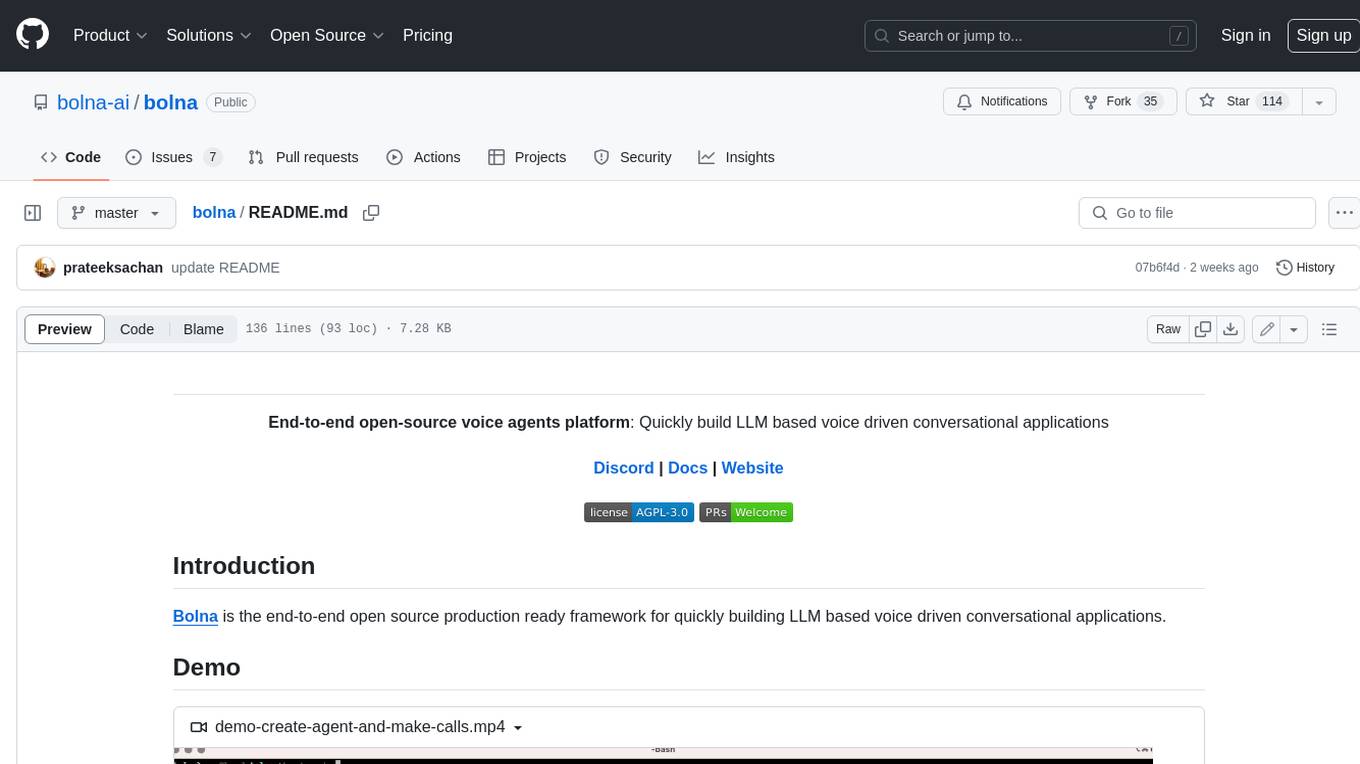
bolna
Bolna is an open-source platform for building voice-driven conversational applications using large language models (LLMs). It provides a comprehensive set of tools and integrations to handle various aspects of voice-based interactions, including telephony, transcription, LLM-based conversation handling, and text-to-speech synthesis. Bolna simplifies the process of creating voice agents that can perform tasks such as initiating phone calls, transcribing conversations, generating LLM-powered responses, and synthesizing speech. It supports multiple providers for each component, allowing users to customize their setup based on their specific needs. Bolna is designed to be easy to use, with a straightforward local setup process and well-documented APIs. It is also extensible, enabling users to integrate with other telephony providers or add custom functionality.
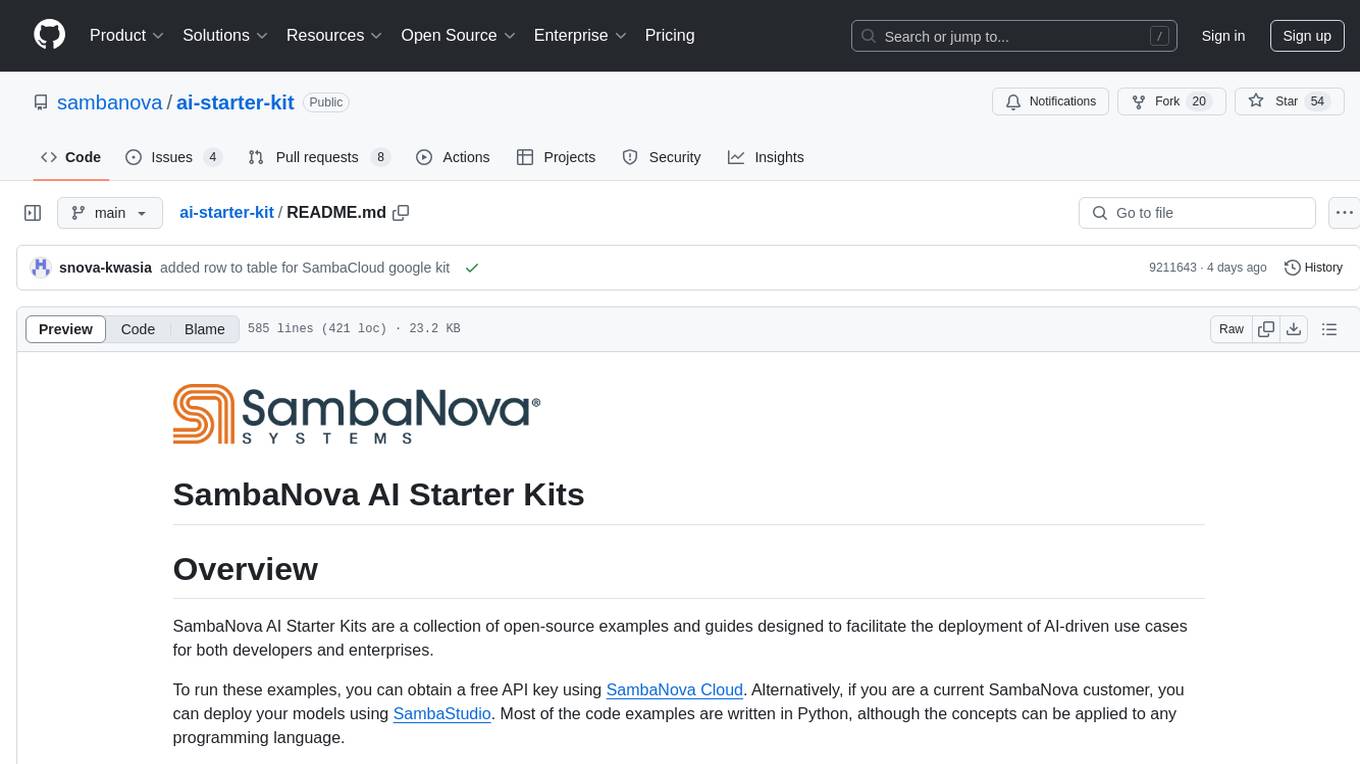
ai-starter-kit
SambaNova AI Starter Kits is a collection of open-source examples and guides designed to facilitate the deployment of AI-driven use cases for developers and enterprises. The kits cover various categories such as Data Ingestion & Preparation, Model Development & Optimization, Intelligent Information Retrieval, and Advanced AI Capabilities. Users can obtain a free API key using SambaNova Cloud or deploy models using SambaStudio. Most examples are written in Python but can be applied to any programming language. The kits provide resources for tasks like text extraction, fine-tuning embeddings, prompt engineering, question-answering, image search, post-call analysis, and more.
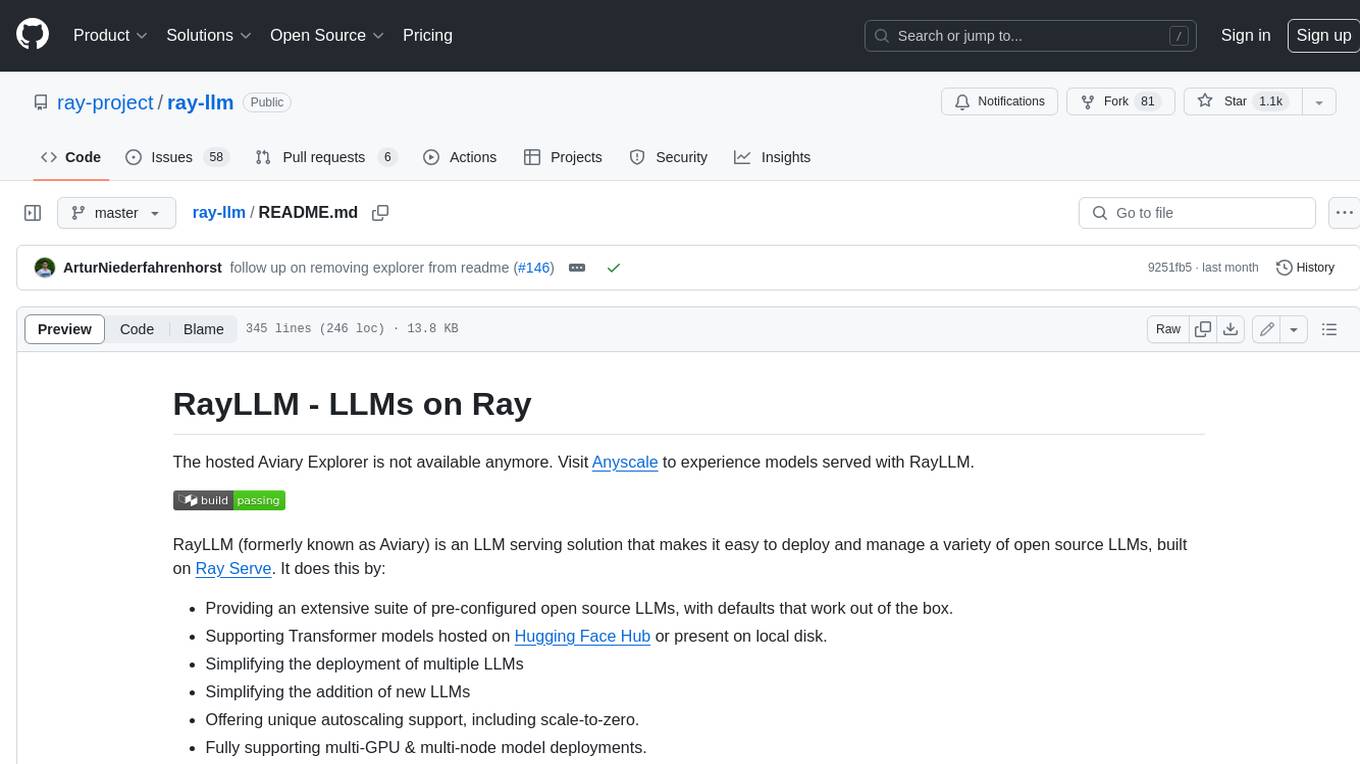
ray-llm
RayLLM (formerly known as Aviary) is an LLM serving solution that makes it easy to deploy and manage a variety of open source LLMs, built on Ray Serve. It provides an extensive suite of pre-configured open source LLMs, with defaults that work out of the box. RayLLM supports Transformer models hosted on Hugging Face Hub or present on local disk. It simplifies the deployment of multiple LLMs, the addition of new LLMs, and offers unique autoscaling support, including scale-to-zero. RayLLM fully supports multi-GPU & multi-node model deployments and offers high performance features like continuous batching, quantization and streaming. It provides a REST API that is similar to OpenAI's to make it easy to migrate and cross test them. RayLLM supports multiple LLM backends out of the box, including vLLM and TensorRT-LLM.
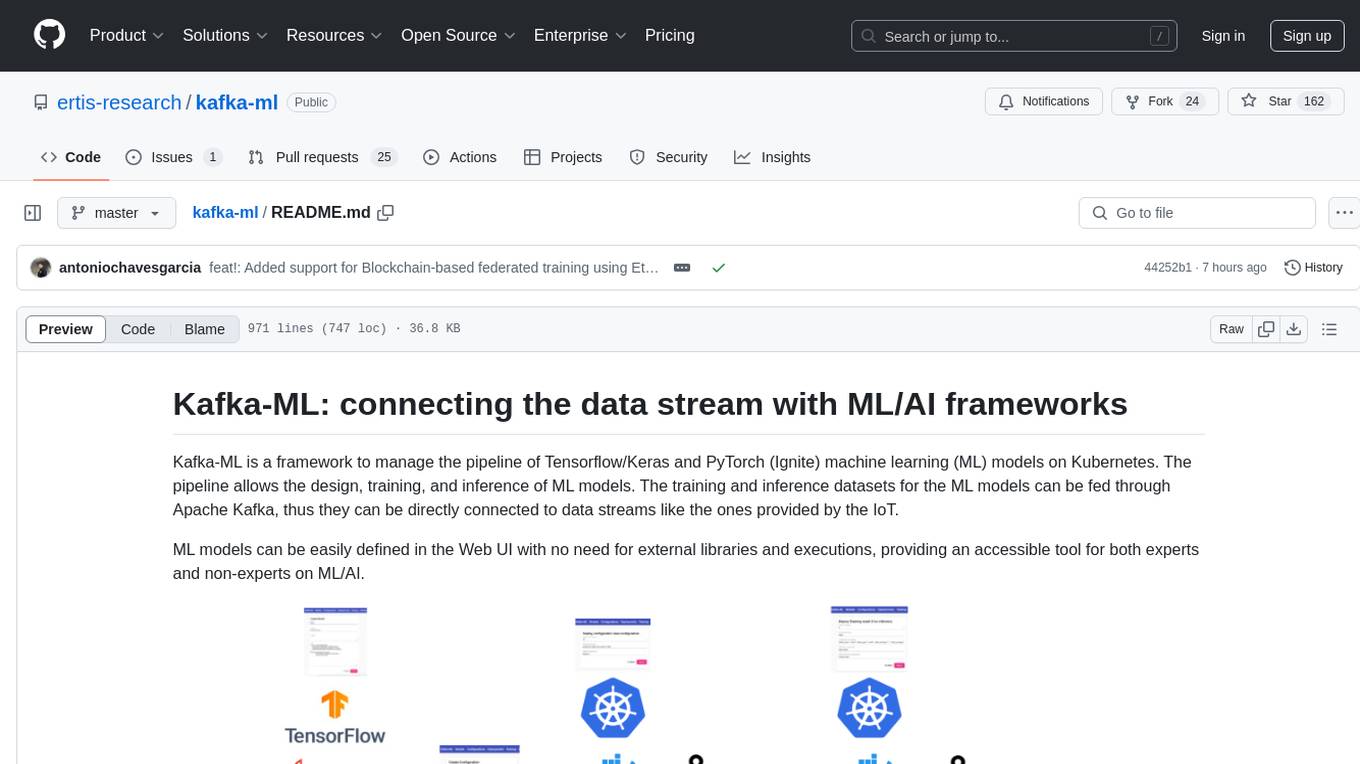
kafka-ml
Kafka-ML is a framework designed to manage the pipeline of Tensorflow/Keras and PyTorch machine learning models on Kubernetes. It enables the design, training, and inference of ML models with datasets fed through Apache Kafka, connecting them directly to data streams like those from IoT devices. The Web UI allows easy definition of ML models without external libraries, catering to both experts and non-experts in ML/AI.
For similar tasks

homeassistant-midea-air-appliances-lan
This custom component for Home Assistant adds support for controlling Midea air conditioner and dehumidifier appliances via the local area network. It provides integration for various Midea appliances, allowing users to control settings such as humidity levels, fan speed, and more through Home Assistant. The component supports multiple protocols and entities for different appliance models, offering a comprehensive solution for managing Midea appliances on the local network.
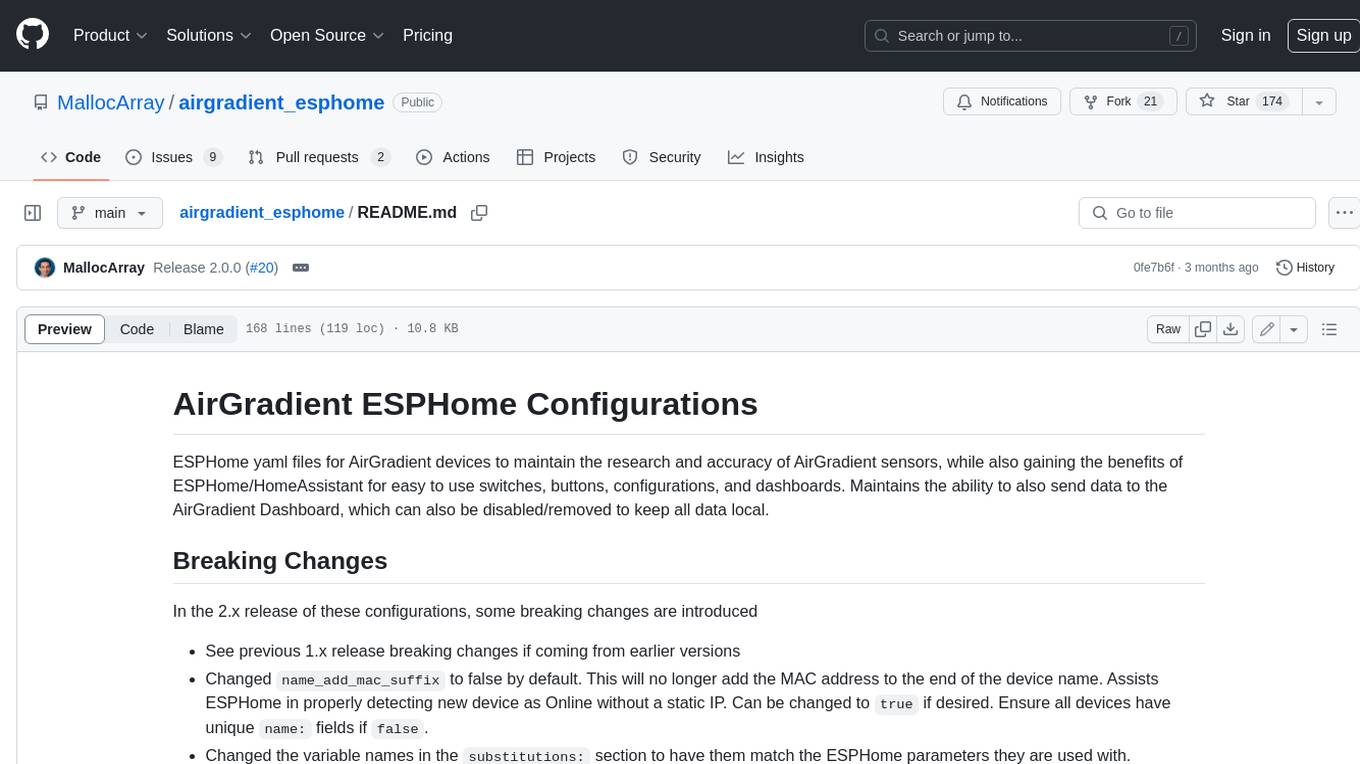
airgradient_esphome
ESPHome yaml files for AirGradient devices to maintain the research and accuracy of AirGradient sensors, while also gaining the benefits of ESPHome/HomeAssistant for easy to use switches, buttons, configurations, and dashboards. Maintains the ability to also send data to the AirGradient Dashboard, which can also be disabled/removed to keep all data local.
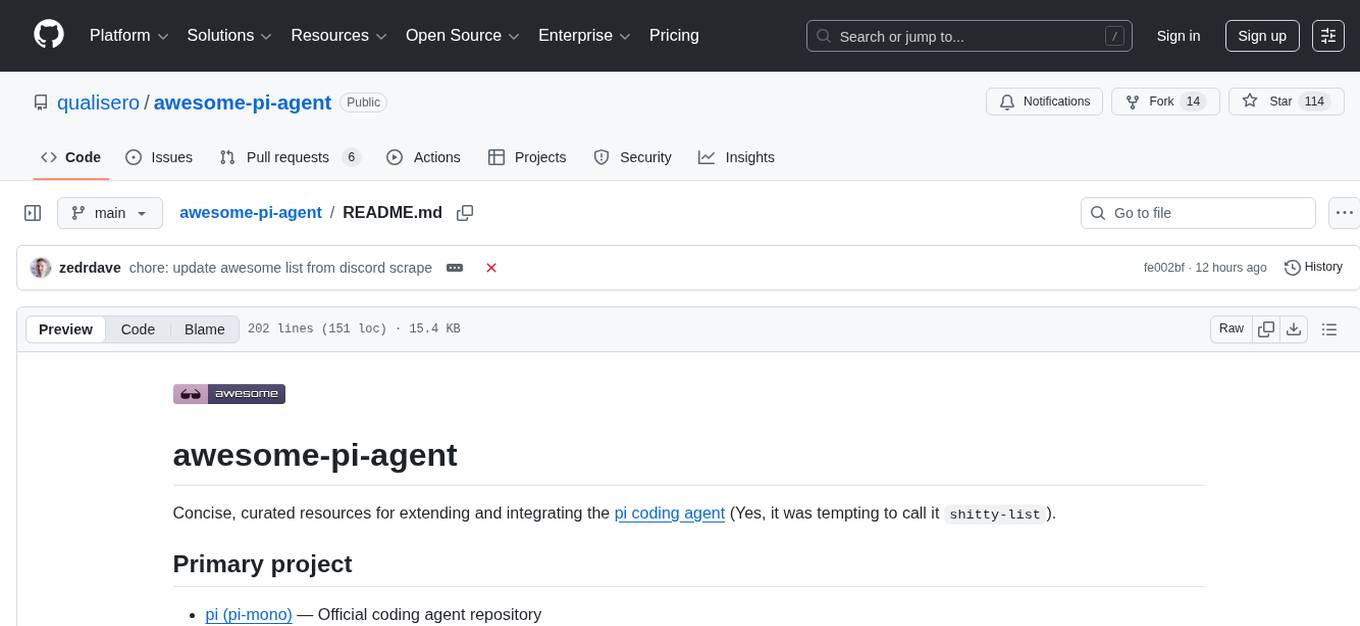
awesome-pi-agent
Awesome Pi Agent is a versatile and powerful tool for building intelligent agents on Raspberry Pi. It provides a framework for developing AI-powered applications that can interact with the physical world through sensors and actuators. With a focus on simplicity and extensibility, this tool enables users to create a wide range of smart devices, from home automation systems to robotics projects. The agent can be easily customized and integrated with various AI algorithms and libraries, making it suitable for both beginners and advanced users interested in exploring the intersection of AI and IoT technologies.
For similar jobs
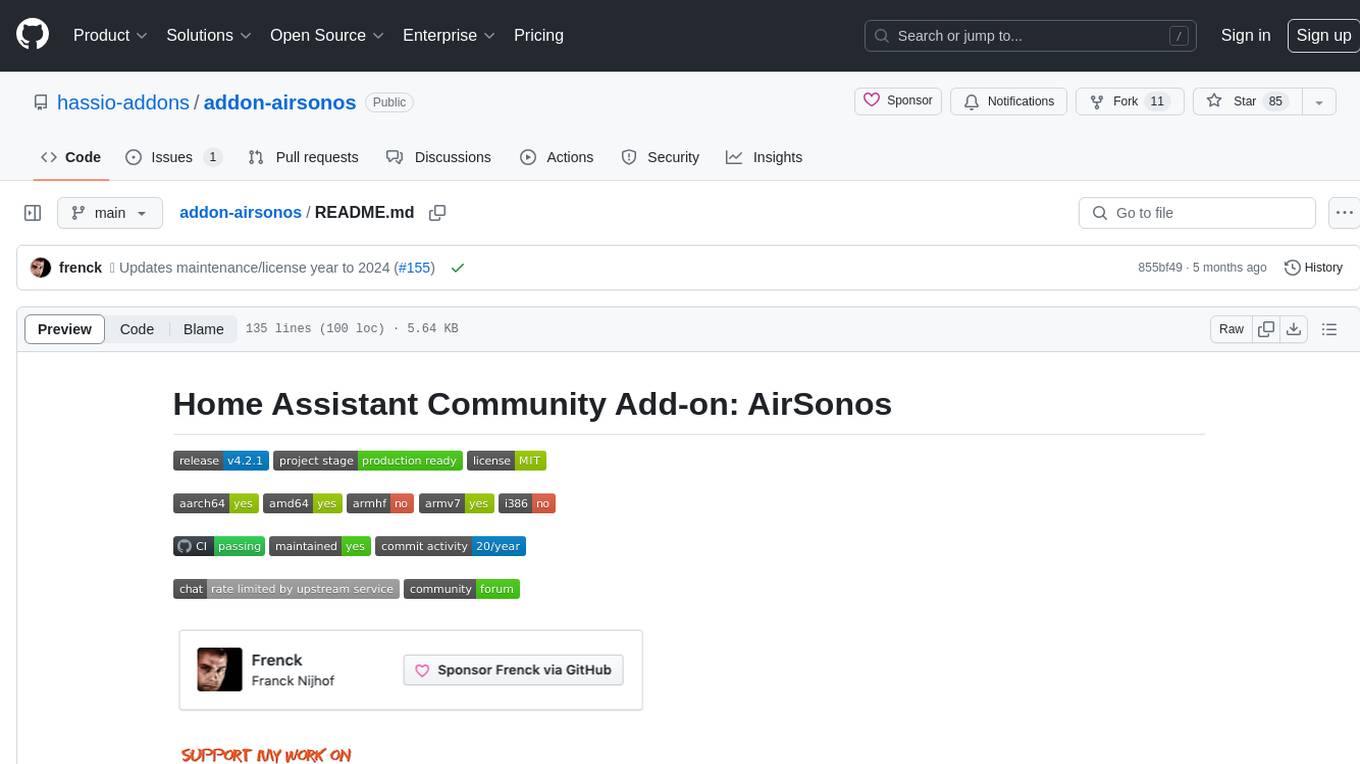
addon-airsonos
AirSonos is a Home Assistant Community Add-on that provides AirPlay capabilities for Sonos (and UPnP) players. It bridges the compatibility gap between Apple devices using AirPlay and Sonos players by creating virtual AirPlay devices for Sonos players in the network. The add-on may also work for other UPnP players like newer Samsung televisions. It is based on the AirConnect project, offering a solution for streaming audio to Sonos devices.
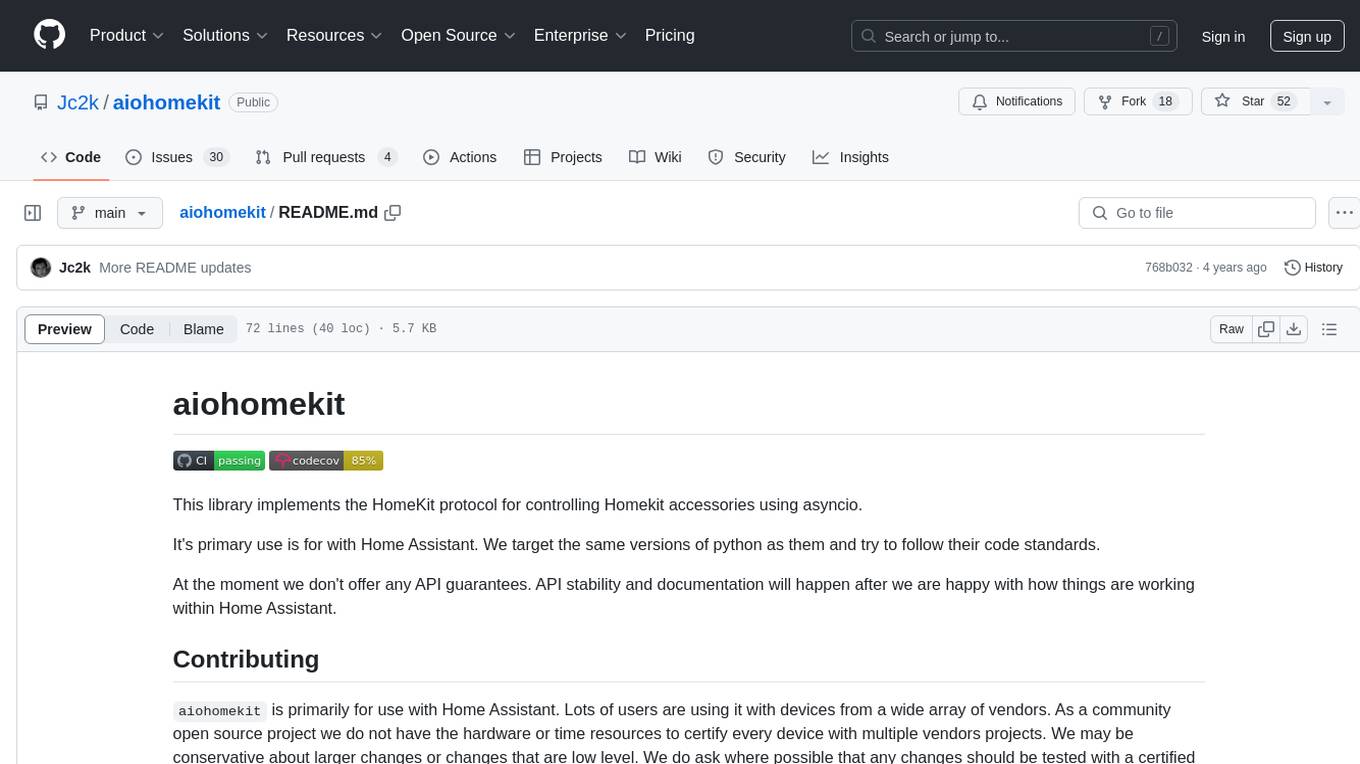
aiohomekit
aiohomekit is a Python library that implements the HomeKit protocol for controlling HomeKit accessories using asyncio. It is primarily used with Home Assistant, targeting the same versions of Python and following their code standards. The library is still under development and does not offer API guarantees yet. It aims to match the behavior of real HAP controllers, even when not strictly specified, and works around issues like JSON formatting, boolean encoding, header sensitivity, and TCP packet splitting. aiohomekit is primarily tested with Phillips Hue and Eve Extend bridges via Home Assistant, but is known to work with many more devices. It does not support BLE accessories and is intended for client-side use only.
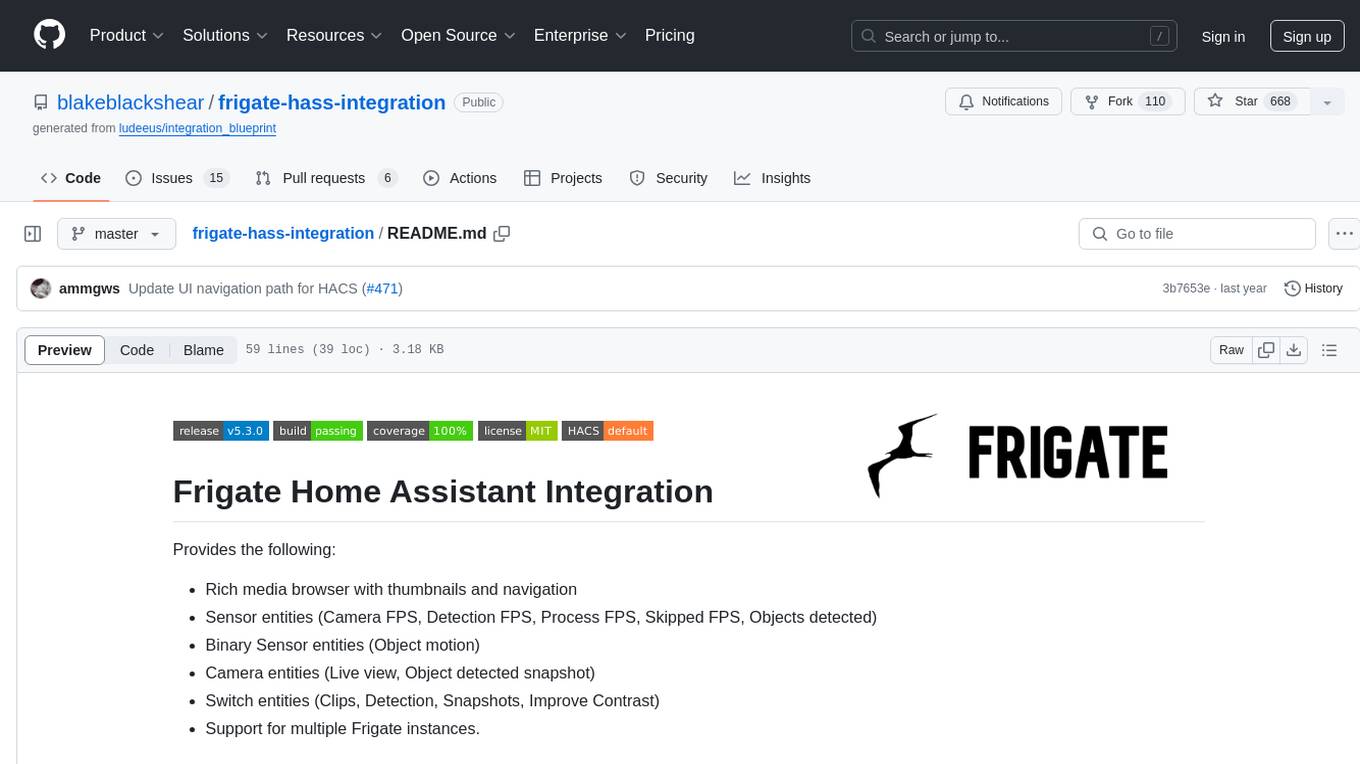
frigate-hass-integration
Frigate Home Assistant Integration provides a rich media browser with thumbnails and navigation, sensor entities for camera FPS, detection FPS, process FPS, skipped FPS, and objects detected, binary sensor entities for object motion, camera entities for live view and object detected snapshot, switch entities for clips, detection, snapshots, and improve contrast, and support for multiple Frigate instances. It offers easy installation via HACS and manual installation options for advanced users. Users need to configure the `mqtt` integration for Frigate to work. Additionally, media browsing and a companion Lovelace card are available for enhanced user experience. Refer to the main Frigate documentation for detailed installation instructions and usage guidance.
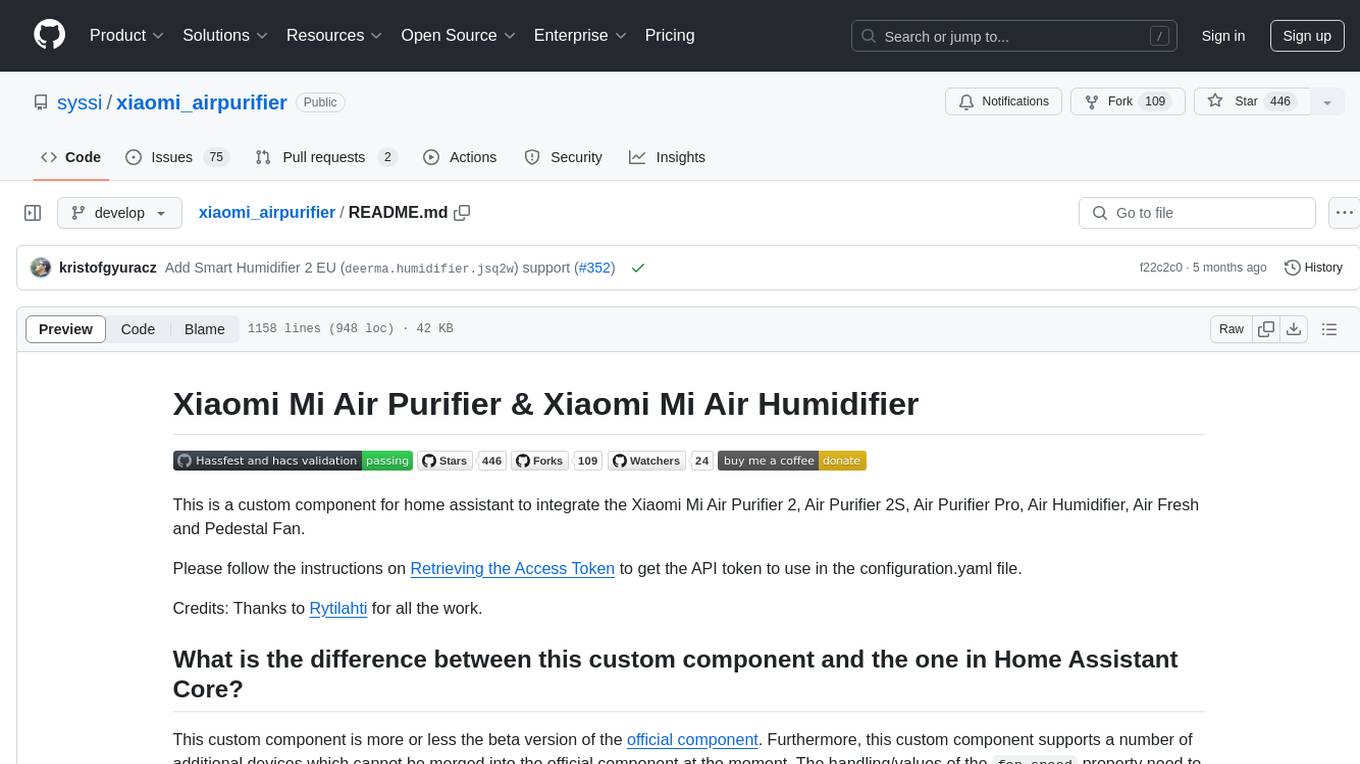
xiaomi_airpurifier
This repository contains a custom component for Home Assistant that integrates various Xiaomi Mi Air Purifier and Xiaomi Mi Air Humidifier models. It provides detailed support for different devices, including power control, preset modes, child lock, LED control, favorite level adjustment, and various attributes monitoring. The custom component offers a more extensive range of supported devices compared to the official Home Assistant component, with additional features and device compatibility. Users can easily set up and configure their Xiaomi air purifiers and humidifiers within Home Assistant for enhanced control and monitoring.

homeassistant-midea-air-appliances-lan
This custom component for Home Assistant adds support for controlling Midea air conditioner and dehumidifier appliances via the local area network. It provides integration for various Midea appliances, allowing users to control settings such as humidity levels, fan speed, and more through Home Assistant. The component supports multiple protocols and entities for different appliance models, offering a comprehensive solution for managing Midea appliances on the local network.
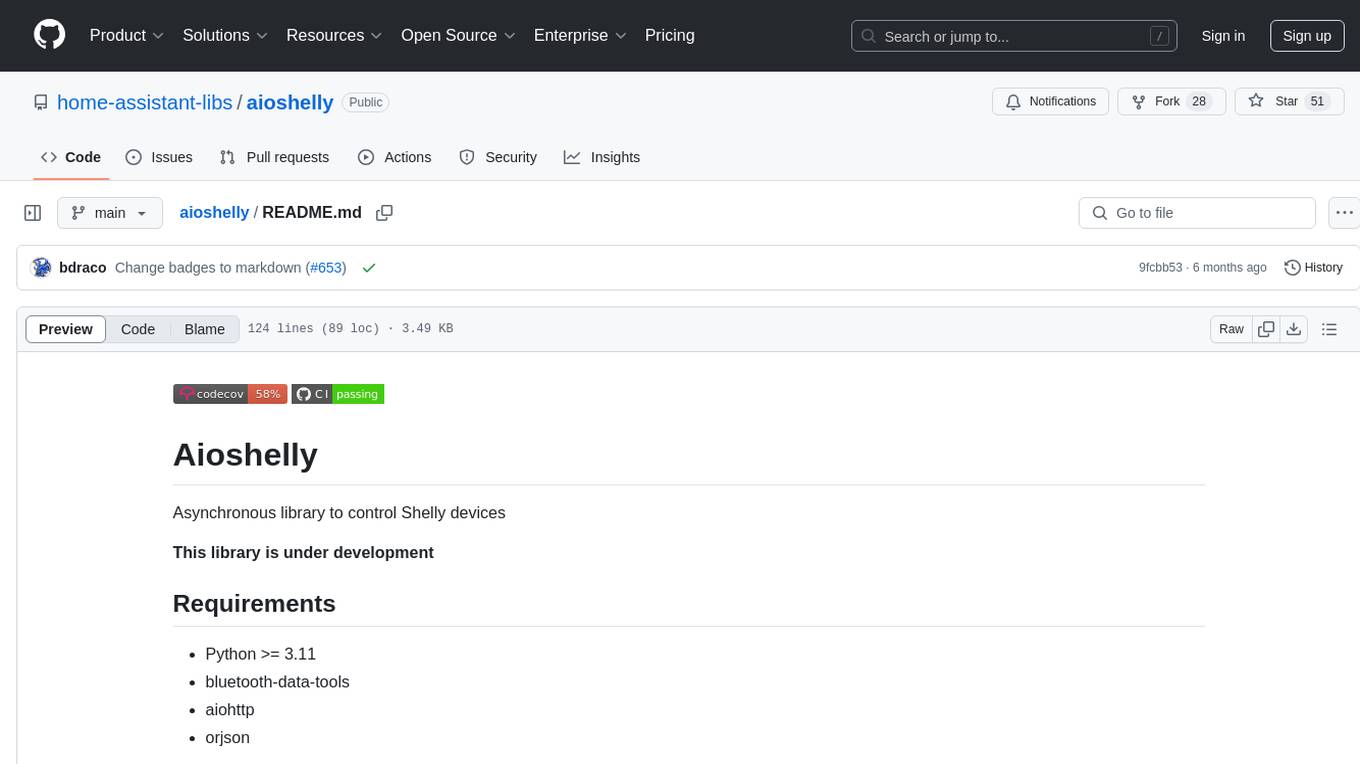
aioshelly
Aioshelly is an asynchronous library designed to control Shelly devices. It is currently under development and requires Python version 3.11 or higher, along with dependencies like bluetooth-data-tools, aiohttp, and orjson. The library provides examples for interacting with Gen1 devices using CoAP protocol and Gen2/Gen3 devices using RPC and WebSocket protocols. Users can easily connect to Shelly devices, retrieve status information, and perform various actions through the provided APIs. The repository also includes example scripts for quick testing and usage guidelines for contributors to maintain consistency with the Shelly API.
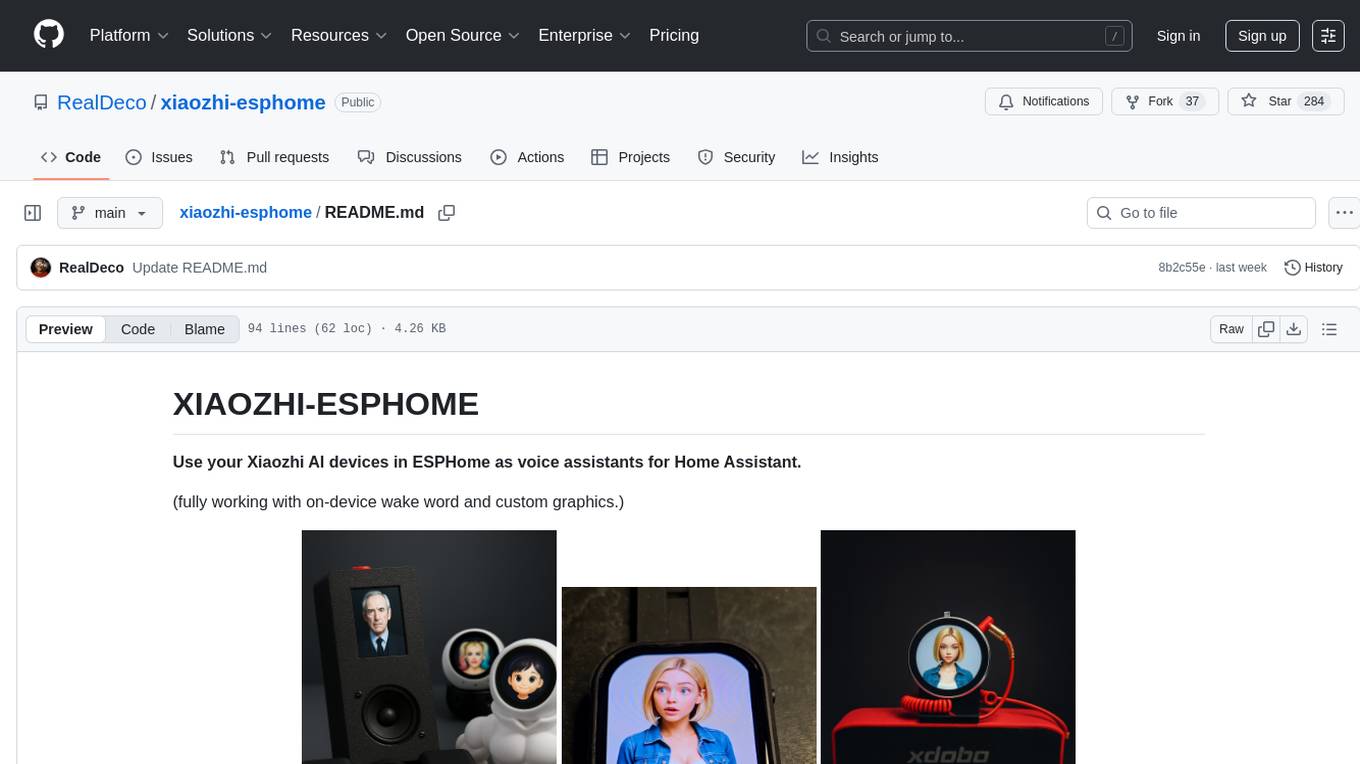
xiaozhi-esphome
This GitHub project provides a simple way to use Xiaozhi-based devices with ESPHome, allowing them to serve as voice assistants integrated with Home Assistant. Users can follow a step-by-step installation guide to connect their devices, edit configurations, and set up the voice assistant. The project supports various devices such as Spotpear Ball, Muma Box, Puck, Guition Taichi pi, Xingzhi Cube, and more. Additionally, it offers links to purchase supported devices and accessories, including 3D files for holders and wireless chargers.
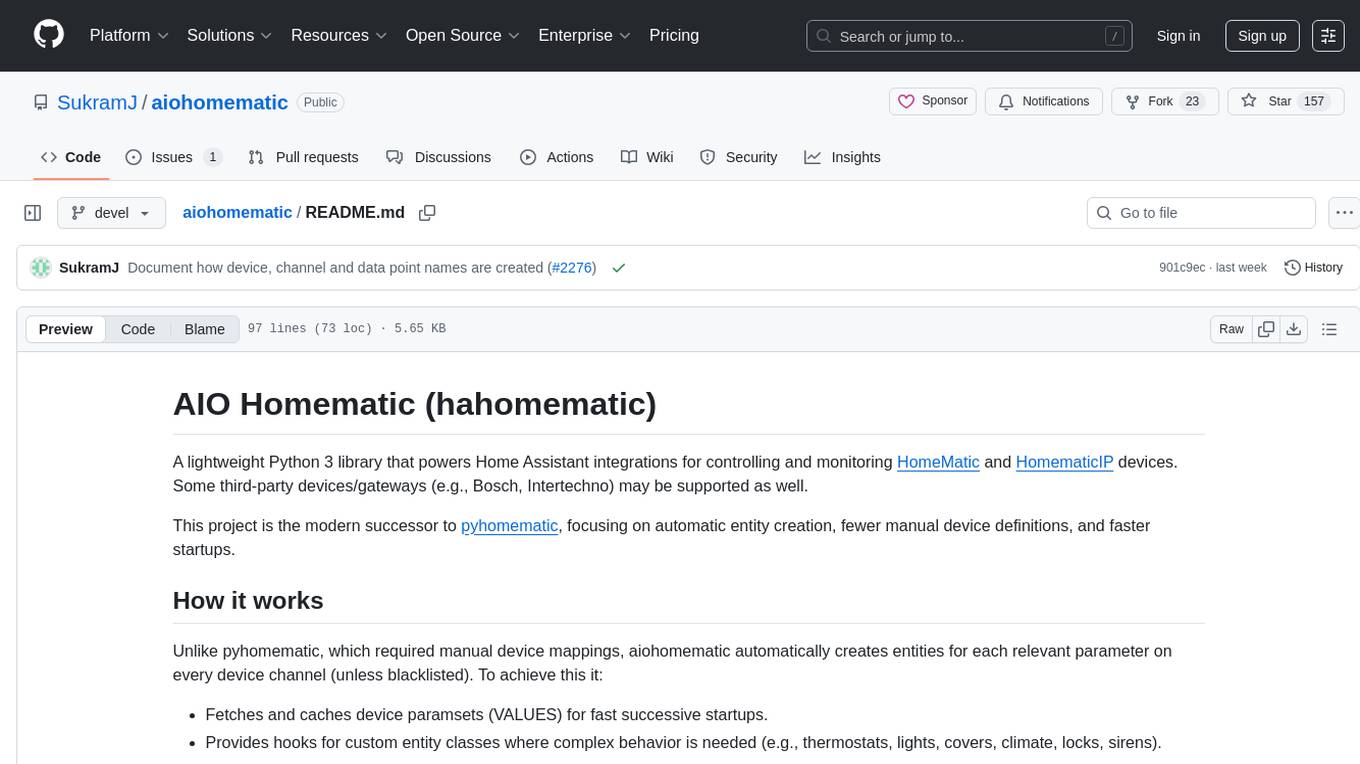
aiohomematic
AIO Homematic (hahomematic) is a lightweight Python 3 library for controlling and monitoring HomeMatic and HomematicIP devices, with support for third-party devices/gateways. It automatically creates entities for device parameters, offers custom entity classes for complex behavior, and includes features like caching paramsets for faster restarts. Designed to integrate with Home Assistant, it requires specific firmware versions for HomematicIP devices. The public API is defined in modules like central, client, model, exceptions, and const, with example usage provided. Useful links include changelog, data point definitions, troubleshooting, and developer resources for architecture, data flow, model extension, and Home Assistant lifecycle.

